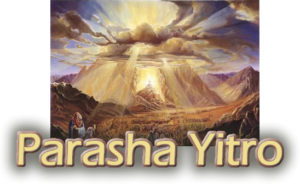 In this week’s parshah, the Israelites travel through the desert towards Mount Sinai. There they prepare themselves to receive God’s Torah. Moses’ father-in-law, Yitro, brings Moses’ wife and children to meet up with him, and he offers Moses the valuable advice of appointing judges and delegating the tasks of offering counsel and guidance and mediating disputes. This parashah also contains the Ten Commandments.
In this week’s parshah, the Israelites travel through the desert towards Mount Sinai. There they prepare themselves to receive God’s Torah. Moses’ father-in-law, Yitro, brings Moses’ wife and children to meet up with him, and he offers Moses the valuable advice of appointing judges and delegating the tasks of offering counsel and guidance and mediating disputes. This parashah also contains the Ten Commandments.
- While Yitro was at the Israelite camp he observed that the people lined up before Moses from morning to night to seek his counsel. He told Moses: The thing that you do is not good. You will surely weary – you as well as this people that is with you – because the matter is heavier than you, you will not be able to do it alone. He advised him to appoint judges to help the people and to come to Moses with only the major issues.
What can we learn from Yitro about the valuable resource of time? What does it mean to delegate? When is it appropriate to delegate and when is it appropriate to do the work yourself? Is a leader made stronger or weaker by delegating?
- The Ten Commandments appear two times in the Torah: once in our parashah this week and once in the book of Deuteronomy and there are some differences between the two versions. For the commandment on Shabbat, the text here says: Remember the Sabbath day to sanctify it … for in six days the Lord made the heavens and the earth, the sea and all that is in them, and He rested on the seventh day. In Deuteronomy, the same commandment says: Keep the Sabbath day to sanctify it… and you shall remember that you were a slave in the land of Egypt and the Lord your God has taken you out from there with a strong hand and an outstretched arm.
What do you think is the difference between “Remember” and “Keep?” Why at Mount Sinai is the reason for Shabbat because God created the world in six days and rested on the seventh, but after the Israelites had journeyed in the desert for many years, the reason given for Shabbat is the miracle of the exodus?
- The Ten Commandments are traditionally divided into 5 between Man and God and 5 between Man and Man. This division places the commandment “Honour your father and mother so that your days will be lengthened upon the land that the Lord your God gives you” on the side of commandments between Man and God.
Why is honouring your parents between you and God and not between you and your parents?
- The final commandment is “You shall not covet.” First the verse specifies that you should not envy your friend’s wife, his male and female servants, his ox and his donkey. It then generalizes that you should envy “anything that belongs to your friend.”
Why would the text bother with specifics when the final generalization includes everything? What can we learn from not envying the whole picture? Do you agree or disagree that this final commandment is the most difficult to uphold? How can transgression of this commandment possibly lead to the transgression of others?
Shabbat Shalom.











